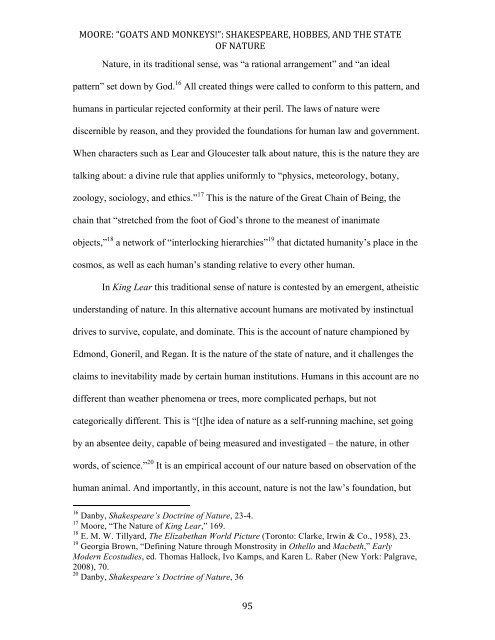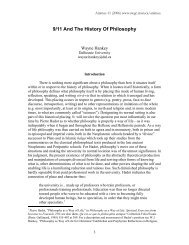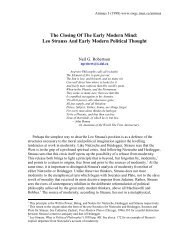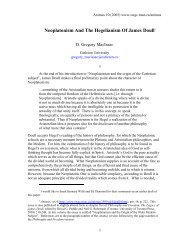âgoats and monkeys!â: shakespeare, hobbes, and the state of nature
âgoats and monkeys!â: shakespeare, hobbes, and the state of nature
âgoats and monkeys!â: shakespeare, hobbes, and the state of nature
Create successful ePaper yourself
Turn your PDF publications into a flip-book with our unique Google optimized e-Paper software.
MOORE: “GOATS AND MONKEYS!”: SHAKESPEARE, HOBBES, AND THE STATE <br />
OF NATURE <br />
Nature, in its traditional sense, was “a rational arrangement” <strong>and</strong> “an ideal<br />
pattern” set down by God. 16 All created things were called to conform to this pattern, <strong>and</strong><br />
humans in particular rejected conformity at <strong>the</strong>ir peril. The laws <strong>of</strong> <strong>nature</strong> were<br />
discernible by reason, <strong>and</strong> <strong>the</strong>y provided <strong>the</strong> foundations for human law <strong>and</strong> government.<br />
When characters such as Lear <strong>and</strong> Gloucester talk about <strong>nature</strong>, this is <strong>the</strong> <strong>nature</strong> <strong>the</strong>y are<br />
talking about: a divine rule that applies uniformly to “physics, meteorology, botany,<br />
zoology, sociology, <strong>and</strong> ethics.” 17 This is <strong>the</strong> <strong>nature</strong> <strong>of</strong> <strong>the</strong> Great Chain <strong>of</strong> Being, <strong>the</strong><br />
chain that “stretched from <strong>the</strong> foot <strong>of</strong> God’s throne to <strong>the</strong> meanest <strong>of</strong> inanimate<br />
objects,” 18 a network <strong>of</strong> “interlocking hierarchies” 19 that dictated humanity’s place in <strong>the</strong><br />
cosmos, as well as each human’s st<strong>and</strong>ing relative to every o<strong>the</strong>r human.<br />
In King Lear this traditional sense <strong>of</strong> <strong>nature</strong> is contested by an emergent, a<strong>the</strong>istic<br />
underst<strong>and</strong>ing <strong>of</strong> <strong>nature</strong>. In this alternative account humans are motivated by instinctual<br />
drives to survive, copulate, <strong>and</strong> dominate. This is <strong>the</strong> account <strong>of</strong> <strong>nature</strong> championed by<br />
Edmond, Goneril, <strong>and</strong> Regan. It is <strong>the</strong> <strong>nature</strong> <strong>of</strong> <strong>the</strong> <strong>state</strong> <strong>of</strong> <strong>nature</strong>, <strong>and</strong> it challenges <strong>the</strong><br />
claims to inevitability made by certain human institutions. Humans in this account are no<br />
different than wea<strong>the</strong>r phenomena or trees, more complicated perhaps, but not<br />
categorically different. This is “[t]he idea <strong>of</strong> <strong>nature</strong> as a self-running machine, set going<br />
by an absentee deity, capable <strong>of</strong> being measured <strong>and</strong> investigated – <strong>the</strong> <strong>nature</strong>, in o<strong>the</strong>r<br />
words, <strong>of</strong> science.” 20 It is an empirical account <strong>of</strong> our <strong>nature</strong> based on observation <strong>of</strong> <strong>the</strong><br />
human animal. And importantly, in this account, <strong>nature</strong> is not <strong>the</strong> law’s foundation, but<br />
16 Danby, Shakespeare’s Doctrine <strong>of</strong> Nature, 23-4.<br />
17 Moore, “The Nature <strong>of</strong> King Lear,” 169.<br />
18 E. M. W. Tillyard, The Elizabethan World Picture (Toronto: Clarke, Irwin & Co., 1958), 23.<br />
19 Georgia Brown, “Defining Nature through Monstrosity in O<strong>the</strong>llo <strong>and</strong> Macbeth,” Early<br />
Modern Ecostudies, ed. Thomas Hallock, Ivo Kamps, <strong>and</strong> Karen L. Raber (New York: Palgrave,<br />
2008), 70.<br />
20 Danby, Shakespeare’s Doctrine <strong>of</strong> Nature, 36<br />
95
















